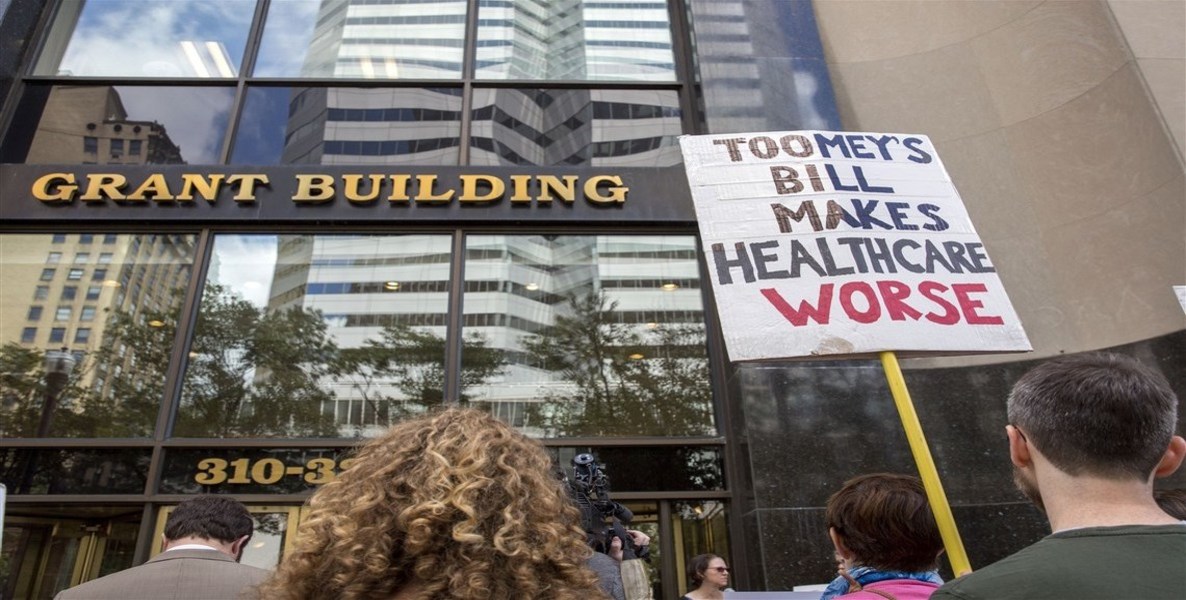One thing that was annoying WURD Contributor Catalina Byrd was that all the focus on the sneakily crafted Senate Republican health care bill seemed to focus on process. “We’re getting caught up in the process and the personalities behind this bill, but in the meantime, they’re shaping and determining the policy,” said Byrd, a veteran Baltimore-based political strategist, during the weekly Reality Check Strategists segment on WURD. “The process is not as important as what’s actually in the bill and how that affects us.”

Byrd makes a good point. Headlines have appeared more drawn to whether or not Senate Republicans could pass their secret health care bill before the July 4th recess, how mean they were for pimping it, and how far the non-partisan Congressional Budget Office went in trashing it. But it has been unclear if the general public—especially places like poverty-stricken Philly—truly understand the full magnitude of what is happening here. Do folks truly grasp the devil in the details to repeal and replace the Affordable Care Act? Most journalists aren’t doing the best job of explaining that. So, instead, anxious citizens have been accosted by a jarring lexicon of wonkish verbiage. All the’ve had left to go by, pretty much, has been the process and the unfolding soap opera of mad villain Senate Majority Leader Mitch McConnell orchestrating a diabolical end run around Democrats and low-income people on Medicaid, and any tweets being pushed out by President DT. And even on the process, where’s that “I’m Just a Bill” guy when you need him to really explain how it all works?
Henry Aaron, Brookings Institution Senior Fellow in Economic Studies, perhaps gave the most simple, 30-second-elevator-pitch description of what is being proposed as he sifted through all the doublespeak. “There are three fundamental things this bill proposes,” said a plainspoken Aaron on Reality Check this week, expounding on his latest op-ed in Brookings. One is that since it stops reimbursing insurance companies for the cost of participating in the Affordable Care Act marketplace, it forces those insurers to withdraw from it. Two is that it’s cutting billions of dollars (nearly $800 billion) from Medicaid and, in effect, dropping folks from Medicaid. And three is that the money “saved” from the two draconian steps above isn’t being used for more healthcare—it’s being used to cover a tax cut for those in wealthy income brackets. Got it?
When Toomey gets all wonky, that’s when you know wolf tickets are being scalped at half price. Harrisburg is grappling with a $1 billion deficit. So where did he get the idea that PA has a fair share to make up for the Senate bill’s gradual rollback in spending on Medicaid?
Sen. Pat Toomey, however, has been doubling down on an assertion that Medicaid expansion will actually be permanent. “The Senate bill will codify and make permanent the Medicaid expansion,” said Toomey on Sunday’s Face the Nation. “And, in fact, we will have the federal government pay the lion’s share of the cost. Remember, Obamacare created a new category of eligibility. Working-age, able-bodied adults with no dependents for the first time became eligible for Medicaid if their income was below 138 percent of the poverty level. We are going to continue that eligibility. No one loses coverage. What we are going to do, gradually over seven years, is transition from the 90 percent federal share that Obamacare created and transition that to where the federal government is still paying a majority, but the states are kicking in their fair share, an amount equivalent to what they pay for all the other categories of eligibility.”
That’s a lot of “eligibility,” but being eligible doesn’t necessarily mean you get covered. And when Toomey’s explanation descends into barely discernible wonk speak (as it does on his website), that’s when you know wolf tickets are being scalped at half price. As far as states “kicking in their fair share,” who’s to say states can and want to? In the case of Pennsylvania, the state Toomey represents, Harrisburg is grappling with a $1 billion deficit. So where did he get the idea that PA has a fair share to make up for the new federal government’s decision to gradually rollback spending on Medicaid?
Toomey understands that, but that’s probably not the entire reason he’s sticking with that schtick and Senate Republicans are pressed to pass their bill. It’s all about the political calculus and putting Pennsylvania’s Democrats on uneasy electoral ground in 2018. If you pass this bill fast enough, you have time to put Democratic Governors like Tom Wolf (D-PA) in a jam, as Pennsylvanians start losing access to healthcare, and Trump Feds and Republicans in Harrisburg predictably point fingers at the Governor: “Well, don’t look at us. Tom is supposed to take care of that.” And based on a recent Center for American Progress analysis of health care coverage loss by state, Pennsylvania is in the Top 10 of states bound to lose big under what the Senate GOP calls the “Better Care Reconciliation Act.” Were that implemented, more than 730,000 non-elderly Pennsylvanians would lose healthcare, including nearly 150,000 kids depending on the Medicaid expansion that Toomey claims will be permanent. An additional 56,000 elderly folks in the Keystone State who rely on Medicaid would also lose out.
The clever play here for Republicans, which is why Toomey is standing ground on his health care talking points, is to make the state election landscape miserable for Democrats in 2018. As Pennsylvanians, especially older voters, are losing health care, their short memories and attention spans will forget all about what Mitch McConnell did in the early summer of 2017. All they’ll be looking at is how state Democrats will manage the ACA marketplace instability and Medicaid collapse in 2018.
When the data is broken down by Congressional district, Philadelphia gets hit the worst. Pennsylvania Congressional districts 1, 2 and 13—Reps. Bob Brady (D-PA), Dwight Evans (D-PA) and Brendan Boyle (D-PA), respectively—are the top three health care coverage losers in PA should the Senate GOP healthcare bill go into effect. Combined, Philadelphia Congressional districts see 173,000 non-elderly individuals losing coverage and more than 12,000 elderly residents losing Medicaid. Evans’ district has the highest number of elderly residents losing Medicaid while Brady’s district shows the highest number of children losing coverage.
This further muddies up Wolf’s re-election chances in 2018, and presents real issues for state Democrats attempting to retake the legislature and for Sen. Bob Casey’s reelection efforts, as well. Wolf is still struggling, with a May Franklin and Marshall poll showing only 41 percent of PA voters giving him a thumbs up versus 52 percent giving him a thumbs down. Casey also faces an uphill battle with just 38 percent approval. And, don’t be fooled by the topline unpopularity of President Trump in major polls: the base is still maintained rather solidly in Pennsylvania, particularly those folks who want a repeal of “Obamacare”—he actually raised his support in the Keystone State since February by 5 points to now 37 percent. Those include voters who get mobilized during “off-cycle” midterms, gubernatorial and state legislative elections.
The clever play here for Republicans, which is why Toomey is standing ground on his health care talking points, is to make the state election landscape miserable for Democrats in 2018. As Pennsylvanians, especially older voters, are losing health care, their short memories and attention spans will forget all about what Mitch McConnell did in the early summer of 2017. Others, mainly white Republicans, will be dancing around the ACA carnage and will reward folks like Toomey for it. For the most part, folks will be looking at how the state Democratic governor will manage the ACA marketplace instability and initial Medicaid collapse in 2018. Republicans, pushing for more gambling and liquor expansion to fill that $1 billion budget gap, will look like fiscal saviors for better or for worse.
Charles D. Ellison is Executive Producer and Host of “Reality Check,” which airs Monday-Thursday, 4-7 p.m. on WURD Radio (96.1FM/900AM). Check out The Citizen’s weekly segment on his show every Tuesday at 6 p.m. Ellison is also Principal of B|E Strategy, the Washington Correspondent for The Philadelphia Tribune and Contributing Politics Editor to TheRoot.com. Catch him if you can @ellisonreport on Twitter.
Header Photo: Antonella Crescimbeni



